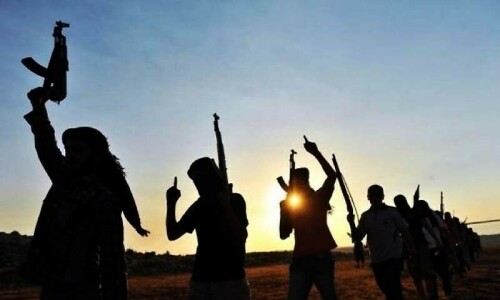BERKIN Elvan, a Turkish teenager, died in 2014 after being in a coma for 269 days. He had been struck on the head by a tear gas shell during Istanbul’s Gezi Park protests in 2013. This tragedy provoked further protests among Turkish liberals, but these soon petered out, as such things usually do. However, three years later, Berkin’s image resurfaced, this time on a poster in Geneva’s Place des Nations, a square outside the United Nations office.
The message on the poster read: “My name is Berkin Elvan. The police killed me on the orders of the Turkish Prime Minister.” At the time, Recep Tayyip Erdogan was prime minister of Turkey.
As soon as the poster — part of an exhibition — went up, the Turkish consulate protested and demanded that it be taken down. But the Swiss government refused, citing freedom of expression. For the touchy Turkish president, this was just another example of European bias against him.
Once more, Turkish patriotism, pride and paranoia have clashed with European laws and liberal traditions. When cities in Germany and Holland refused permission for ruling Turkish AK Party ministers to hold rallies to drum up support for next month’s referendum that seeks to hand over unprecedented powers to Erdogan, he and his colleagues erupted. “I thought Nazism was over,” he thundered. “But I was wrong. In fact, Nazism is alive in the West.”
Apart from accusing Germany and Holland of being run by “remnants of Nazism”, Erdogan advised Turkish women living in Europe to “have five children each as three are not enough”. Three is the number he has been suggesting to Turkish women at home, much to the ire of feminists.
He also brought in the recent European Court ruling that permits employers to demand that employees avoid wearing garments that proclaim religious belief. While applying to all faiths, this decision was made in response to a legal challenge from a Muslim woman who was fired for wearing a headscarf at work. Erdogan declared he was fed up of this Islamophobia: “Where is the freedom of religion, freedom of conscience?” His interior minister, Suleyman Soylu, was even more provocative: “Let’s send 15,000 migrants a month to Europe to shock them.”
European response has been relatively muted, and Angela Merkel, the German Chancellor, has said her government would not descend to Erdogan’s level. However, the Nazi insults have stung badly, especially for Germans who have lived with the stigma for decades.
There was apprehension in Holland that the spat with Turkey would drive voters in the recent elections to support Geert Wilders, the right-wing Islamophobic populist. Although he did less well than he had hoped, his party still emerged with the second largest bloc of seats. As the Turkish residents of Holland demonstrated against the decision to prevent AK Party rallies on security grounds, Wilders was able to point to their Turkish flags and say: “These people aren’t Dutch.”
For Erdogan, the whole episode has been a win-win exercise. Had he been permitted to hold rallies, he might have persuaded more Turks in the European diaspora to vote “Yes” to the constitutional changes proposed in the 14 April referendum. But by being refused permission, he has been able to claim that the West is against a strong presidency, and thus a strong Turkey. As for any long-term damage he might have caused to relations with key European states, he doesn’t really care.
Turkey’s long-held ambitions to join the European Union lie in tatters. Apart from the recent bad blood, Erdogan’s crackdown on real and imaginary political foes has caused concern and revulsion in Europe. Claiming to be fighting on three fronts against the militant Islamic State grouo, the Kurdish separatist group known as the PKK, and the Gullenists, Erdogan is asking the Turkish people for enhanced powers as the executive and all-powerful president.
Despite beating loudly on the nationalist drum, and having a large state propaganda apparatus behind him, the outcome of the referendum is far from certain. The tightness of the polls is one reason Erdogan is reaching out to the four million Turks in the European diaspora. One tracker poll shows ‘Yes’ voters at 48 per cent, while the ‘No’ vote is projected at 52pc. Another puts both sides at 40pc, with 20pc undecided. While opinion polls in Turkey are notoriously unreliable, these numbers do reflect a surprising degree of ambivalence over giving Erdogan powers that even Mutafa Kemal Ataturk, the founder of modern Turkey, did not enjoy.
A defeat in the referendum would be a huge setback for Erdogan. Had he not been such a towering figure in modern Turkish politics, such a stinging rejection would have spelled an end to very successful career. But Erdogan is a resilient politician who has bounced back more than once, and his AK Party has a solid constituency in Turkey’s conservative Anatolian heartland.
Indeed, his rise from a poor Istanbul neighbourhood to a 1,000-room palace in Ankara has been phenomenal by any yardstick. Under him, the economy has flourished and the powerful military has been cut down to size. But his large ego has been his undoing. His ambition to determine Syria’s fate following the outbreak of the civil war six years ago has caused a wave of terrorism in Turkey, and has forced many to re-examine his judgement and his good sense.
Above all, his growing authoritarian tendencies have alarmed many in and out of Turkey. For these people, a victory for the ‘No’ camp in the April referendum will be a victory for Turkey.
Published in Dawn, March 20th, 2017















































